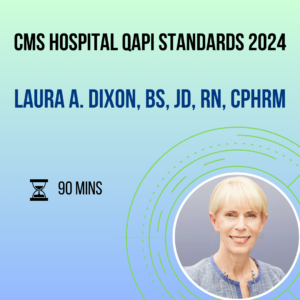Marketing and Empathy Psychology
Discharge Planning: Compliance with CMS Hospital & CAH CoPs
By - Laura A. Dixon, BS, JD, RN, CPHRM
Lorem ipsum dolor sit amet, consectetur adipiscing elit. Ut elit tellus, luctus nec ullamcorper mattis, pulvinar dapibus leo.
- 06 Aug - 21 Oct 2022
- 10:00 - 12:00
- July 9, 2024 | Available all day |
- 60

Overview
Every hospital that accepts Medicare and Medicaid must comply with the CMS discharge planning guidelines. These standards must be followed for all patients and not just Medicare or Medicaid. CMS requires several discharge planning policies and procedures so learn which ones are required and why
CMS published changes to the discharge planning standards in February 2020, but has yet to publish revised interpretive guidelines and survey procedures to match the new regulations.
This program will discuss the Impact Act and how it affects hospital discharge planning. It requires standardized assessment, quality data, and resource data requirements. It requires hospitals to assist patients with post-discharge care such as home health, skilled nursing facilities, long term care hospitals and inpatient rehab facilities. Patients have freedom of choice and now information on all four must be provided to the patient except for CAHs.
The new regulations cover sections on patient timely access to medical records, the discharge planning process, discharge instructions, discharge planning requirements. It will cover transfers to other facilities, assessment of readmission within 30 days, caregiver rights and recommendations, reduction of factors that lead to preventable readmissions, timely discharge planning, and more.
Discharge Planning Conditions of participation for Critical Access hospitals will be discussed briefly. Those regulations follow the Acute hospitals requirements.
Objectives/Outcomes
- Discuss the CMS has revised the discharge planning requirements that apply to all hospitals and critical access hospitals
- Recall patients and physicians can request a discharge planning evaluation
- Discuss that information about the hospitalization must be provided to the physician or provider before the first post hospital visit
- Describe that the patient has a right to get medical records timely including a copy of their discharge plan
Agenda
- Introduction
- Deficiency data for discharge planning
- Discharge planning process and the IMPACT Act
- Identification of patients needing discharge planning
- Role of support person
- Incapacitated patient
- Discharge planning process
- RN, social worker, or qualified person to develop evaluation
- Timely evaluation
- Discussion of evaluation with patient or individual acting on their behalf
- Discharge evaluation in the medical record
- Documentation of the discharge process
- Discharge plan
- Physician request for discharge planning
- Implementation of the patient’s discharge plan
- Reassessment of the discharge plan
- Freedom of choice for post-acute care providers
- Transfer or referral
- Critical Access Hospital Discharge planning requirements
- Discharge planning metrics
- Appendix and Resources
- Resources and internet links
Who Should Attend?
- Discharge planners
- Transitional care nurses
- Social workers
- All staff nurses who discharge patients in a hospital setting
- Chief nursing officer
- Nurse educators
- Chief operation officer
- Chief medical officers
- Physicians
- Risk managers
- Regulatory/Compliance officer
- UR nurses
- Joint Commission coordinator
- Chief executive officer
- Nurse managers
- PI director
- Health information director
- Patient safety officer
- Any person serving on a hospital committee to redesign the discharge process to prevent unnecessary readmissions.
Vulputate eros arcu magnis donec sem pretium scelerisque a etiam. Eros aliquam elit si mattis phasellus at orci letius ligula posuere. Sodales maecenas facilisis diam egestas dictumst si fames mus fermentum conubia curabitur. Ornare nisi consectetur semper justo faucibus eget erat velit rhoncus morbi.
Speaker Detail

Laura A. Dixon, BS, JD, RN, CPHRM
Laura A. Dixon recently served as the Regional Director of Risk Management and Patient Safety for Kaiser Permanente Colorado where she provided consultation and resources to clinical staff. Prior to joining Kaiser, she served as the Director, Facility Patient Safety and Risk Management and Operations for COPIC from 2014 to 2020. In her role, Ms. Dixon provided patient safety and risk management consultation and training to facilities, practitioners, and staff in multiple states. Such services included creation of and presentations on risk management topics, assessment of healthcare facilities; and development of programs and compilation of reference materials that complement physician-oriented products. Ms. Dixon has more than twenty years of clinical experience in acute care facilities, including critical care, coronary care, peri-operative services, and pain management. Prior to joining COPIC, she served as the Director, Western Region, Patient Safety and Risk Management for The Doctors Company, Napa, California. In this capacity, she provided patient safety and risk management consultation to the physicians and staff for the western United States. Ms. Dixon’s legal experience includes medical malpractice insurance defense and representation of nurses before the Colorado Board of Nursing. As a registered nurse and attorney, Laura holds a Bachelor of Science degree from Regis University, RECEP of Denver, a Doctor of Jurisprudence degree from Drake University College of Law, Des Moines, Iowa, and a Registered Nurse Diploma from Saint Luke’s School Professional Nursing, Cedar Rapids, Iowa. She is licensed to practice law in Colorado and California.
Webinar Information
- Duration : 60
- Date: July 9, 2024 | Available all day
- 06 Aug - 21 Oct 2022
- 10:00 - 12:00
- Jakarta, Indonesia
Share this event
Related products
-

CMS Hospital QAPI Standards 2024
$199.00 – $349.00 Select options -

How to Defend Against Recoupments, Repayment Demands and SIU Audits.
$249.00 – $449.00 Select options -

Legal & Ethical Challenges for Employers: An Increase In Burnout, Stress, & Mental Illness
$199.00 – $349.00 Select options -

The Disruptive Physician Practitioner: A Danger to The Hospital’s Operation
$199.00 – $349.00 Select options



